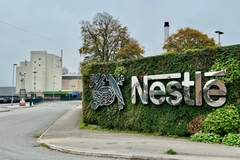
- Industry news
Industry news
- Category news
Category news
- Reports
- Key trends
- Multimedia
- Journal
- Events
- Suppliers
- Home
- Industry news
Industry news
- Category news
Category news
- Reports
- Key trends
- Multimedia
- Events
- Suppliers
Sustainable Foods Summit Targets Climate Change and Ingredients

Climate change and sustainable ingredients are the focal themes of the fourth edition of the Sustainable Foods Summit, taking place in Amsterdam on 23-24 June 2011. By focusing on two of the major sustainability issues in the food industry, the summit aims to share industry best-practices and encourage sustainability initiatives.
4/12/2011 Climate change and sustainable ingredients are the focal themes of the fourth edition of the Sustainable Foods Summit (www.sustainablefoodssummit.com), taking place in Amsterdam on 23-24 June 2011. By focusing on two of the major sustainability issues in the food industry, the summit aims to share industry best-practices and encourage sustainability initiatives.

The new edition looks at how food and ingredient firms can create positive environmental and social impacts. This is the subject of Professor Dr. Michael Braungart, co-founder of the Cradle-to-Cradle (C2C) design approach, in his opening key note. The C2C design has been widely praised for its regenerative approach, encouraging nutrients to be recycled or re-used when products reaches the end of their lifecycle.
The first session showcases pioneering sustainability initiatives in the food industry. Key papers cover novel sustainability approaches, ethical trading partnerships, sustainability metrics and ecological packaging. The growing importance of food security will be covered by Dr. Ulrich Hoffmann at the United Nations Conference on Trade and Development (UNCTAD). His paper will look at the role of sustainable agriculture in meeting the needs of a global population that is projected to exceed 9 billion by 2050.
Also in the opening session, details of the newly launched global water footprint standard will be given by Ruth Mathews, Executive Director of Water Footprint Network. To meet growing concerns about water scarcity and water stress, the new standard enables countries, companies and individuals to assess their water footprint. Precise details of the new water footprint methodology will be provided, as well as water measurement calculations for various food & beverage products. The first session adjourns with a panel discussion on sustainability indicators and measurement approaches.
Although climate-change is high on the international agenda, few food and beverage companies appear to be taking steps towards a low carbon economy. The second session hones in on climate change strategies, highlighting practical approaches for measuring, reducing and offsetting carbon emissions. In the opening paper, Worldwatch Institute will share its latest findings from its 2011 State of the World report. It will give international examples of innovations in sustainable agriculture and food systems, highlighting their importance in combating climate change. The Carbon Disclosure Project will outline practical strategies for food & beverage companies looking to reduce their carbon footprints.
Considering livestock comprises most agricultural greenhouse gases, sustainable livestock farming is a major feature of the second session. Growing consumer affluence is expected to double meat and dairy production by 2050, straining agricultural resources as well as raising carbon emissions. The SAI platform discusses sustainability measurement approaches for dairy production, whilst Professor Dr. Ir. Rudy Rabbinge from Wageningen University explores the various sustainable protein options.
Migros, the leading Swiss supermarket chain, will share its sustainability programmes to combat climate change. In another paper, a major food company will share its vision, programmes and associated challenges of becoming a carbon neutral enterprise. The European company will state how it has made changes in its manufacturing processes and energy sources to reduce its carbon footprint, and made investments in reforestation projects to offset emissions.
With marketing and distribution playing a decisive role in the success of sustainable food products, the third session shares best-practices. Major developments and trends in the global market for eco-labelled foods will be given, followed by a paper on building a sustainable brand. Diederik Brasser from Trilobes will discuss the role of distribution and logistics in reducing environmental impacts. Royal Ahold, a leading European retailer, will share its challenges in meeting the triple bottom line. Other papers cover traceability & transparency in the supply chain, market segmentation, and consumer insights towards ethical consumers.
The final session of the two-day summit focuses on sustainable ingredients. Since multi-ingredient food products can have complex environmental and social footprints, papers look at the growing use of sustainable ingredients to reduce these impacts. The trading of green certificates programmes in commodity sourcing is the subject of Green Palm. IBD Certification will show it has integrated social and biodiversity elements into its Eco-Social organic standard. Hilary Parsons, Head of Corporate Social Responsibility at Nestlé will state how ethical sourcing can create positive social impacts.
The difficulties in setting up sustainable supply chains for novel ingredients will be covered by Dr. Maha Misbah from Unilever. The Anglo-Dutch multinational recently won a biodiversity award for its Allanblackia project in Africa. Dr. Misbah will show how companies can convert new ideas for novel ingredients into commercial reality whilst providing market access and benefits to growers in developing countries.










